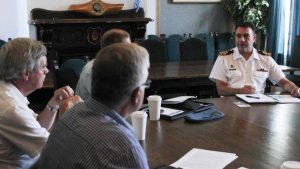 With RCN ships recently wrapping up a deployment to Op Caribbe, a MARLANT naval officer visited members of the Royal United Services Institute of Nova Scotia on July 27 to relay the relevance of the mission and pass on facts to RUSI(NS) members.
With RCN ships recently wrapping up a deployment to Op Caribbe, a MARLANT naval officer visited members of the Royal United Services Institute of Nova Scotia on July 27 to relay the relevance of the mission and pass on facts to RUSI(NS) members.
The group heard from LCdr Sylvain Bernier, the MARLANT MCC Watch Commander supporting CJOC. LCdr Bernier gave a detailed rundown of the operation, explained some of the limits placed on RCN ships operating in the specified area of the operation, and went through the reasons why the ongoing mission has been important for North American security and for the RCN’s relationship with our allies.
Understanding the importance of the operation, which focuses on illicit trafficking by organized crime, is important for RUSI(NS), whose members often speak to media or publish papers on defence issues, helping to push the message of the CAF and RCN out to the public in some instances.
“Op Caribbe is really to establish and strengthen our relationships with the international participants, and also to demonstrate the national commitment to the defense of North America,” LCdr Bernier said.
The counter-narcotics work on Op Caribbe is important, but equally so is the maintaining of relationships and development of interoperability that comes with physical participation in an operation. For the United States, who lead the interagency task force on preventing illicit trafficking in the Caribbean and Eastern Pacific Ocean, being able to publicize the important role of partners like Canada acts as a further deterrent for criminal organizations. Other partners involved include France, the Netherlands, Spain and the UK.
LCdr Bernier also explained the nature of the MOU, signed in 2010, that outlines the role of RCN ships carrying US Coast Guard Law Enforcement Detachments on Op Carribe. RCN personnel do not have the authority to board suspicious vessels or detain those suspected of drug trafficking on their own, and when the LEDET detains suspected criminals, the accused are to remain in their own vessel, or on a RHIB flying the US flag, until authorities arrive, unless the scenario involves risk of life at sea.
For 2016, HMC ships Moncton, Summerside, Edmonton, and Saskatoon deployed to Op Carribe, seizing or disrupting a total of approximately 4,260 kg of cocaine and 1,520 kg of marijuana, withSummerside and Saskatoon involved in the highly publicized seizures of almost 700 kg of cocaine off the coast of Nicaragua. The CAF has been involved the multinational campaign since 2006.
The Kingston-class vessels have done the heavy lifting for the RCN on Op Carribe over the last two years, which itself is a statement to the capability and versatility of the MCDVs, but LCdr Bernier said that hasn’t always been the case. Over the last five years, most of our Maritime assets have been involved, including Halifax-class frigates, destroyers Athabaskan andAlgonquin, HMCS Preserver, and two Victoria-class submarines that have deployed to the mission. And as the conclusion of the HCM/FELEX process brings more sea time for frigates and the new Arctic and Offshore Patrol Ships are introduced to the fleet in coming years, both of those classes of ships could possibly be deployed to Op Caribbe, LCdr Bernier said.
RUSI(NS), an arms-length defense organization, serves as a discussion and education forum on Canadian defence and security issues, often hosting speakers or roundtable discussions. Membership is open to anyone interested.
Source: Herald More
